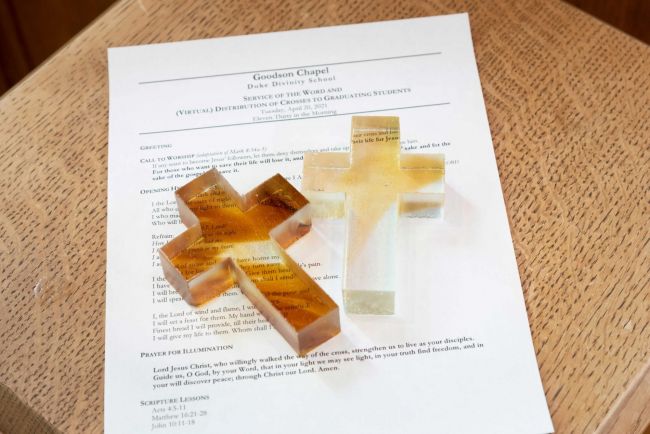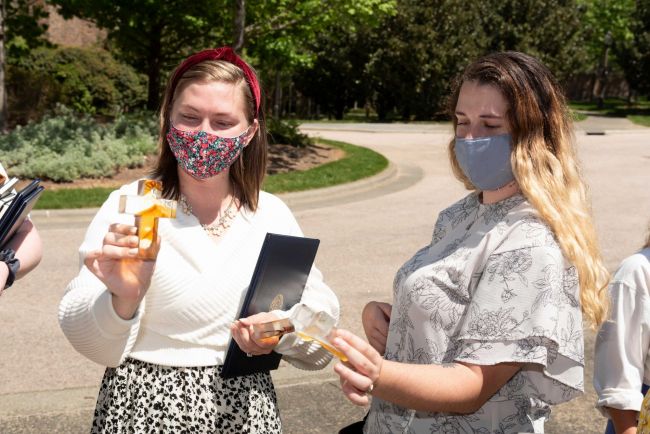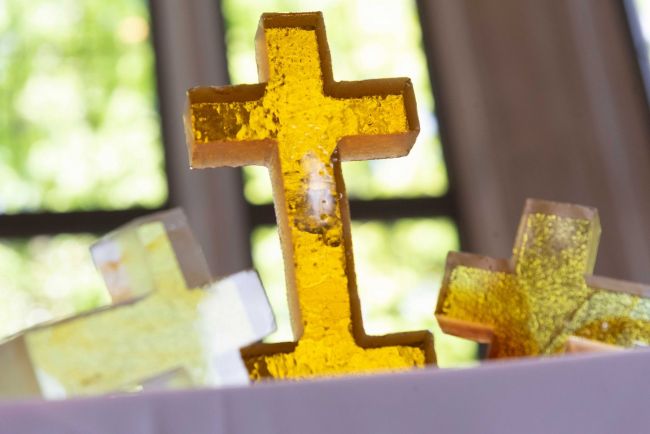In events held over several weeks in April and May, Duke Divinity School celebrated the 2021 graduates who completed their degrees: 107 Master of Divinity; 40 Master of Theological Studies; 12 Master of Arts in Christian Practice; 11 Master of Theology; 31 Doctor of Ministry; and 6 Doctor of Theology. For many, half their degree program or more was completed during restrictions in response to the pandemic. They navigated learning in hybrid and HyFlex models and in socially distanced and masked classroom settings. They wrote papers and took exams in spaces usually reserved for sleeping or eating or family time. They did their field education and ministry formation remotely over Zoom, and they managed to built community to support and encourage each other to this moment of graduation.
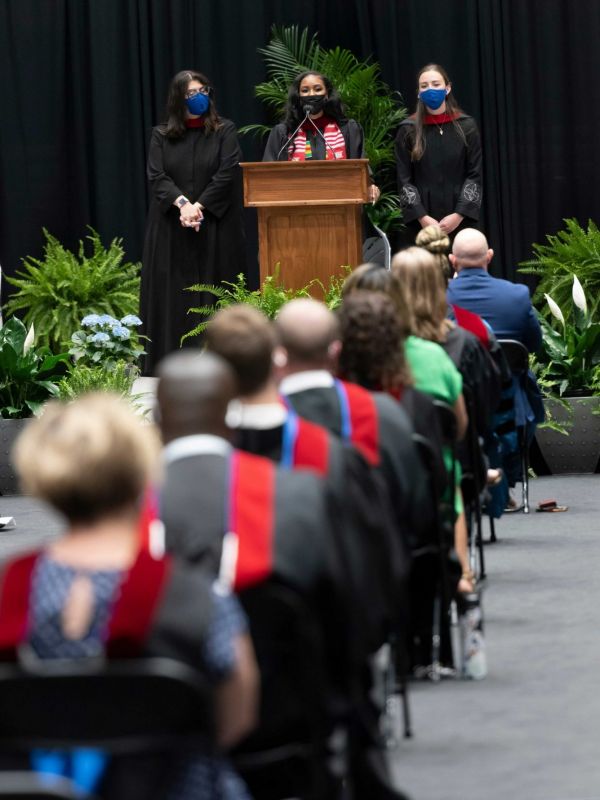
In an in-person graduation event held May 5 at Cameron Indoor Stadium, Duke Divinity Student Council Co-President Amber Scott, M.Div.’21, reminded the graduating class how long they had persevered to that point: 421 days since COVID-19 upended everyone’s expectations for what their Duke Divinity journey would look like. “In these 421 days, we made it through by deepening our trust in God and leaning into our communities to sustain us through these seasons. We’ve grown in tremendous ways.”
Both the events to celebrate these graduates and their reflections about their time at Duke Divinity hold together the tension and the beauty of lament and joy for this season.
The challenges posed by COVID-19, the trauma of racial injustice, the heightened pain of economic disparities, and the grief from loss of loved ones and isolation—all of these affected every aspect of what it meant to study at Duke Divinity over the past many months, from course instruction to community building. Yet these graduates chose to stay in their programs, innovating, grieving, learning, and demonstrating that their calling to ministry was powerful and could not be derailed by a virus or injustice.
The words community and relationships have been a constant refrain when graduates described their decisions to continue their degrees.
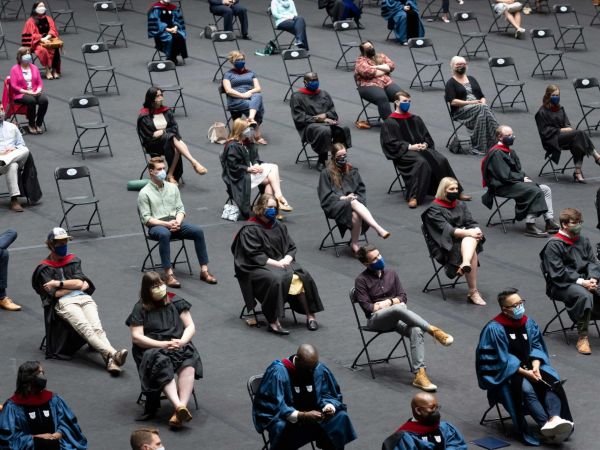
Emmy Yang, M.T.S.’21 and TMC Fellow, said: “I am thankful to have established community from my first year of the master’s program and Theology, Medicine and Culture (TMC) Fellowship. I chose to continue with my program to maintain these connections and to build off the academic work and spiritual formation from year one. I also witnessed a new level of intentionality and creativity. I had socially distant outdoor study groups for my New Testament lecture in the fall. The Divinity School librarians started Curbside Take-Out for students who could not access campus buildings. With the widespread adoption of Zoom, the TMC Seminar Series hosted speakers from as far as Haiti this semester.”
The importance of formation and the certainty of their calling were two other themes that sustained these 2021 graduates. “There is no doubt that continuing school and working throughout the pandemic was a challenge,” said Amber Scott. “This was the reality for many of my colleagues. The reason I continued pursuing my M.Div., rather than pausing during this season, is because this is a pivotal time to continue my formation as a faith leader. The church is at a critical point where we must not reactively respond but rather proactively innovate during these times of COVID-19, the rise in activism, and the numerous calls for equity. I intentionally wanted to continue learning and wrestling with coursework that informs how I show up as a faith leader after graduation.”
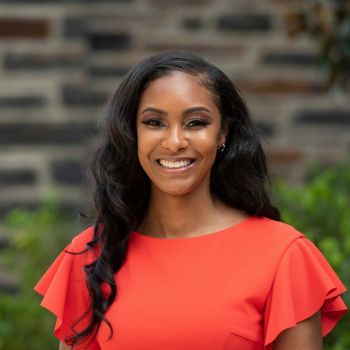
“These are some of the questions that I sat with during the second half of my Duke Divinity career: What does it mean to serve as a minister who promotes equity for all people? How can the church innovate and use technology to promote faithful Christian discipleship? What is the church’s response to navigating questions or concerns about the COVID-19 vaccine? What are the ethics behind encouraging/not encouraging parishioners, or the larger community, to take the vaccine? Journeying with these questions in the midst of finishing my M.Div. during the pandemic was really important to me. This is why I continued the degree program.”
This graduation season has included naming both grief and gratitude. “There was a tangible sense of loss: of the delicate conversations best had in-person, the table fellowship of shared meals together, and the communal celebrations over the holiday season,” said Yang. “These experiences were integral to my first year of the TMC Fellowship and what I missed the most this academic year.”
Yet in the midst of that loss, they were grateful for the efforts of the school to respond, innovate, and support their formation, both in and out of the classroom. Scott named the ways the school took seriously the issues of racial injustice and cultural competency in the wake of the murder of George Floyd. “Duke Divinity faithfully responded to the call for racial and institutional equity by establishing task forces to address these concerns. This response was pivotal to my preparation as a faith leader because I witnessed what it means to respond to fundamental issues facing our society in real-time. I am forever grateful to have witnessed these changes while engaging with scholars and theologians in the classroom who inform much of what is happening throughout this pandemic.”
As they conclude their time at Duke Divinity, how do graduates reflect on their formation? Kyle Tremblay, M.Div.’21, who has been appointed to a two-point charge in Texas, Kosse UMC and Reagan UMC, said he never seriously considered pausing his M.Div. studies, and the past year and a half has shaped him in important ways: “It has forced me to re-evaluate much of my life, what I value, what brings me joy, how God is calling me, and more.” He identified two key elements of his formation that will stay with him and continue to inform his ministry: relationships formed at Duke, and his field education experiences.
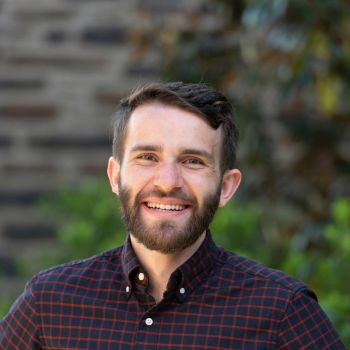
I will carry these friendships with me in the sermons I preach, and they will sit alongside me as parishioners grieve and as we laugh till we cry. Looking back at my time at Duke, I can easily say my favorite part of these three years have been my field education placements. I have loved every single one and have learned so much from the mentors and friends I had at each of them. I got the chance to build relationships with migrants in Tijuana, walk with high schoolers preparing to be the first in their family to attend college, and learn alongside churches in how to do Pandemic Church. My last placement at Millbrook UMC was one of the hardest goodbyes I have had to say in a long time as I felt so loved in that space, so appreciated for my gifts, and that’s such a powerful thing to have.
After her M.T.S., Yang is returning to my fourth year of medical school at the Icahn School of Medicine at Mount Sinai (in New York City), where she will begin start back on clinical rotations and shortly thereafter apply to residency programs in internal medicine. “It’s bittersweet, she said. “I’m looking forward to returning to patient care, but I will miss the people who have made my experience at Duke one of the most formative of my life thus far.”
After graduation, Scott plans to continue serving with the faith-rooted nonprofit in her home state of New Jersey to liberate public policy, working alongside state legislators and community advocacy groups to promote racial, economic, policing, education and health care equity, and she will also serve as a Young Adult pastor. “I give all the glory and praise to God for making it to graduation! I am truly grateful. At times it is hard to believe how quickly three years flew by! I am feeling a bit nostalgic because I will truly miss being in Durham, walking throughout the Divinity School, and being on campus. However, I am hopeful and eager to continue applying all that I learned over the past three years and faithfully serve my community.”
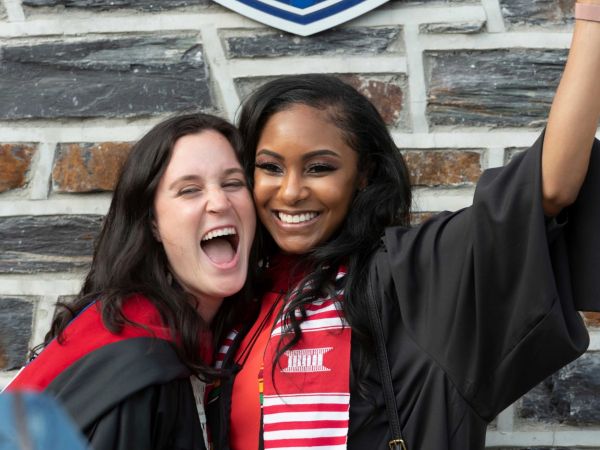
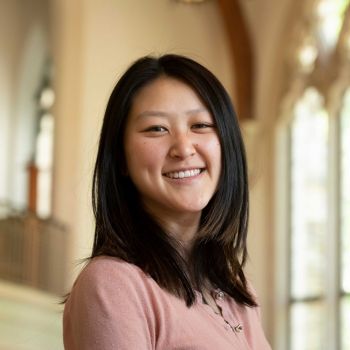
“When I first entered Duke Divinity School in the fall of 2019, I worried that I would not belong as someone newer to the Christian faith. I remember speaking to Cathy Watson, director of student life, in Goodson Chapel, during the baptismal renewal service. She affirmed to me: ‘You absolutely belong here.’ I came to learn how wholeheartedly true that was. Fourteenth-century mystic Julian of Norwich talks about the enfolding love of God in her visions, detailed in Revelations of Divine Love. I’ve experienced this enfolding love in the DDS community in many ways.”
Additional services to celebrate Duke Divinity graduates include: Closing Convocation, with graduate awards announced and a sermon by Luke Powery, dean of Duke Chapel and associate professor of homiletics; and a Baccalaureate Service for the Class of 2020 and a Baccalaureate Service for the Class of 2021, both with a sermon by Edgardo Colón-Emeric, Irene and William McCuthchen Associate Professor of Reconciliation and Theology, associate dean for academic formation, director of the Center for Reconciliation, senior strategist for the Hispanic House of Studies, and incoming dean of Duke Divinity School. All services are available to watch online at the Duke Divinity School YouTube channel.
Senior Cross Service
A beloved tradition at Duke Divinity School since 2006, the Senior Cross Service was held April 20 in Goodson Chapel, with limited in-person attendance and with streaming available for those viewing remotely. The graduating class chooses the preacher, and this year Associate Professor of Old Testament Anathea Portier-Young was selected. Usually the crosses are distributed as part of the service as graduates receive their cross at the front of the chapel, along with a personal blessing from a faculty or staff member. While that was not possible this year, a distribution event was set up outside the Westbrook Building following the service.
The color of the cross changes each year, with each representing part of the liturgical calendar. The color for 2021 is gold, which represents Feast and Festival Days. As Chaplain Meghan Feldmeyer Benson noted, “This gold is a mixture of light and shadows, like this year. The gold woven into these crosses is the color of sweet honey and hope and celebration.” The crosses are handmade by the Statesville Glass Company in Statesville, N.C., and no two are exactly alike. That is especially true this year, when the crosses range from pale glass flecked with gold to a rich, dark amber. These crosses are a tangible reminder that “Hope is always there: sometimes bold, sometimes subtle,” said Benson.
